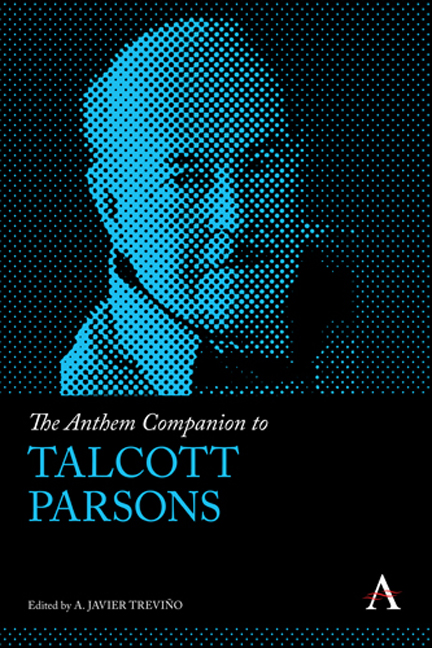Book contents
- Frontmatter
- Content
- Introduction
- Part I Political and Humanist Concerns
- Chapter One Fighting the Deadly Enemy of Democracy: Sociology against National Socialism
- Chapter Two Parsons's Critique of the Power Elite Thesis: Foundations for a Comprehensive Theory of Power
- Chapter Three The Expressive Revolution and the University: Parsons vs. Gouldner
- Chapter Four Parsons, Psychoanalysis and the Therapeutic Relationship
- Chapter Five Meanings of Life and Death: Insights of the Human Condition Paradigm
- Chapter Six Luhmann's Reception of Parsons
- Part II Social Evolution and the American Societal Community
- Contributors
- Index
Chapter Two - Parsons's Critique of the Power Elite Thesis: Foundations for a Comprehensive Theory of Power
from Part I - Political and Humanist Concerns
Published online by Cambridge University Press: 22 July 2017
- Frontmatter
- Content
- Introduction
- Part I Political and Humanist Concerns
- Chapter One Fighting the Deadly Enemy of Democracy: Sociology against National Socialism
- Chapter Two Parsons's Critique of the Power Elite Thesis: Foundations for a Comprehensive Theory of Power
- Chapter Three The Expressive Revolution and the University: Parsons vs. Gouldner
- Chapter Four Parsons, Psychoanalysis and the Therapeutic Relationship
- Chapter Five Meanings of Life and Death: Insights of the Human Condition Paradigm
- Chapter Six Luhmann's Reception of Parsons
- Part II Social Evolution and the American Societal Community
- Contributors
- Index
Summary
Talcott Parsons is, of course, widely acknowledged as the great systematic theorist of modern sociology. What is not so often recognized is that his work shows an ongoing central interest in the empirical study of contemporary American society. Theory, for Parsons, is a means to empirical understanding and not a mere end in itself. While this aspect of Parsons's work is often overlooked, it is essential for any proper understanding of his theoretical ideas.
This empirical intent is nowhere more apparent than in his concern for the study of political power. Parsons's politics are liberal and democratic, and his work is geared to showing how power is organized in the twentieth-century liberal democracies that are the successors to the classical liberal societies of the nineteenth century. He traced the ways in which the authoritarian societies of prewar Germany and Japan departed from liberal democratic principles and how the Soviet Union departed in a totalitarian direction from the pluralistic pattern of American society. These concerns are the basis for his critical engagement with C. Wright Mills, who he sees as the principal advocate of a totally different view of American society. According to Parsons, Mills's political radicalism leads him into a fundamental misunderstanding of the pluralistic liberal democracy of the United States. This claim brings Parsons close to the arguments made by Dahl and Polsby, but Parsons aims to go beyond their criticisms to construct a novel theoretical understanding of power.
In this chapter I set out Mills's view of political power and social stratification that served as the critical foil against which Parsons proposed an alternative conceptualization of power. I will show how Parsons derived this alternative view from his earliest reflections on social theory and how he made it into an integral element in his general theory of social systems.
Mills and the Power Elite
Mills famously regarded himself as a “plain Marxist,” a self-description that highlighted the fact that he utilized many of the concepts and theoretical ideas proposed by Marx but treated these as hypotheses to be empirically tested. Thus he regards the idea that capitalist societies are dominated by ruling classes as being a plausible suggestion but not as something to be merely assumed by fiat.
- Type
- Chapter
- Information
- The Anthem Companion to Talcott Parsons , pp. 43 - 54Publisher: Anthem PressPrint publication year: 2016

